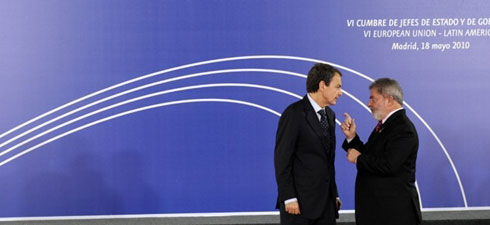"The global economic crisis dominated the sixth EU-Latin America and Carribean Summit, which brought heads of state and government leaders from 60 countries to Madrid" reports Bogotà daily El Espectador. "Inaugurated in Brazil eleven years ago, the diplomatic rendez-vous aims to establish greater economic ties and improved cooperation between the Old and the New World. There are many reasons to justify this initiative," argues its rival El Tiempo, which notes that "the EU is the number one investor in Latin America as well as its second largest trading partner.
"However,"the Colombian newspaper continues: "the international context is more complex and certainly more problematic than it was on the occasion of previous summits. Much water has flowed under the bridge since the last EU-LAC, held in Lima in 2008. When the first summit took place in Rio de Janeiro in 1998, the EU was brimming over with prosperity, while most of the countries of Latin America were mired in recession. Today the tables have turned: with only a few exceptions, Latin American states have been spared by the economic crisis, while European countries have entered into a difficult period of adjustment."
International aid main victim of cost cutting
"European governments have been forced to implement severe fiscal austerity measures, and international aid is one of the main victims of this cost cutting," complains Los Andes, which dwells on the meager results of some of the summit negotiations, notably "the puny sum of five million euros for Mercosur" (the free-trade zone in the region's Southern Cone) and the overall figure of "three billion in aid for Latin America." The Argentinean daily also focuses on "fears for Latin-American exports," which may be affected by "the severe crisis that has struck European economies."
The most remarkable results of the summit will likely prove to be the successful conclusion of negotiations —that had long been stalled — for a multi-party trade agreement between Peru, Colombia and the countries of Central America (Costa Rica, El Salvador, Guatemala, Honduras, Nicaragua and Panama), and the reopening of negotiations with Mercosur, the Southern Cone free-trade zone (composed of Brazil, Argentina, Paraguay and Uruguay), which had been suspended since 2004 adds another Argentinean paper Página 12. The Buenos Aires daily also notes that the EU-LAC summits "promote the multi-lateralism advocated by Europe as opposed to the bi-lateralism, which figures large in US relations with the region."
EU-LAC a "pointless summit"?
However, this is a view not shared back in Europe by El País, which remarks that relations between Europe and Latin America remain largely bilateral in character. Citing as evidence the proceedings at the Madrid summit, the Spanish daily explains that leaders from both continents "take advantage of the opportunity for dialogue offered by the summits," but these talks are rarely conclusive because "Latin America is not a single negotiating entity, which is more or less the case of the EU."
The summit "should have been a culminating high-point for the Spanish Presidency of the EU," but it will not be enough compensate for negative events during Spain's period in office, "which was marked by panic on financial markets and dragged down by the recession," notes El Periódico, in Barcelona. Another Spanish paper, La Vanguardia sounds an even more negative note in its report, which describes the 2010 EU-LAC as a "pointless summit" marked by an excessively wide-ranging agenda "with discussions on multi-lateralism, immigration and energy: in short, on everything and anything."
No Chávez, no Castro
La Jornada highlights participants' commitment to "end impunity" for crimes against humanity perpetrated by dictatorships on both continents, and statements "on the issue of femicide and violence against women." As the Mexican daily reports, there was plenty of discussion on human rights and violence against women, however, in the columns of Madrid's ABC the influential blogger Yoani Sánchez regrets that there was absolutely no mention of Cuba. For Sanchez, "the EU's common position on human rights is a major force for positive change on the Cuban regime."
At the same time, "notable absences" — which included the German Chancellor Angela Merkel, French President Nicolas Sarkozy, British Prime Minister David Cameron, and Italy's Silvio Berlusconi as well as the non-attendance of the Venezuelan and Cuban leaders Hugo Chávez and Raúl Castro – weighed heavily on the "goal of greater entente between global partners," which Los Andes notes, was one of the main objectives of the Madrid summit.
For La Vanguardia the no-shows on the European side are a testament to the fact that "most of the European partners continue to view Latin America as a mainly Spanish concern." And according to El Tiempo, this situation is unlikely to change anytime soon: "a large number of the 27 member states do not have cultural or historical links with Latin America. When we factor in the current climate of economic crisis, it is clear that relations with the region are unlikely to figure high on European agendas in the near future."
Was this article useful? If so we are delighted!
It is freely available because we believe that the right to free and independent information is essential for democracy. But this right is not guaranteed forever, and independence comes at a cost. We need your support in order to continue publishing independent, multilingual news for all Europeans.
Discover our subscription offers and their exclusive benefits and become a member of our community now!












